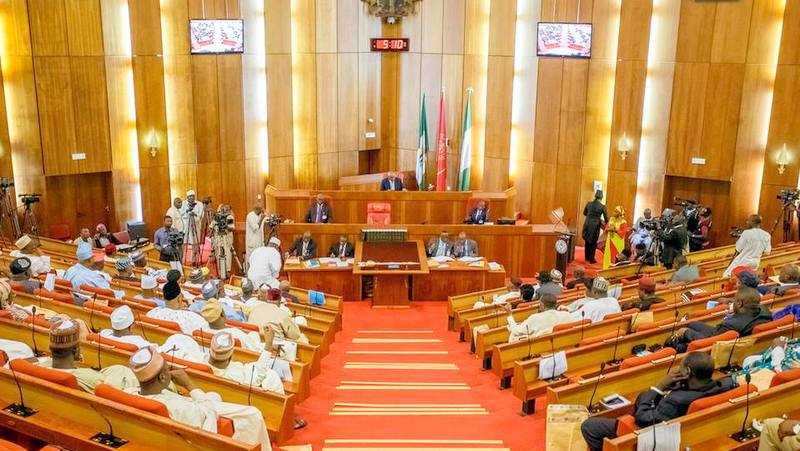- Prices of staple food soared in August – NBS
BY FESTUS OKOROMADU, ABUJA
The value of listed equities investors traded in Nigeria reached a high of N2.42trillion in eight months to August 31, 2023.
This is higher than N1.89trillion recorded in the same eight-month period of 2022, according to equities trading data at the Nigerian Exchange Limited.
The broadly positive sentiment that had lingered in the Nigerian equities market since the start of May persisted through August.
Though, investors saw the value of their investments decline by N91billion in the just-ended month of September as the market dropped by 0.25 percent following sessions of profit-taking after the August rally.
The stock market, which saw sections of profit-taking and bargain hunting, had reached a 15-year high in August.
In January 2023, stocks trading worth N195.10billion were recorded.
In February it grew to N188.91billion, but decreased to N146.22billion in March.
It rose again to N191.21billion in April, N322.92billion in May, and N406.75billion in June.
The value of equities trading which reached N702.98billion in July decreased remarkably to N262.56 billion in August.
The report shows that foreign investors had in eight months to August 2022 traded stocks worth N301.37 or 15.97percent of the review period’s total while their local counterparts were responsible for N1.585 trillion or 84.03percent.
Foreign inflow was N95.26billion while foreign outflow was N127.52billion.
Domestic retail investors traded equities worth N737.57billion while domestic institutional investors traded N1.456trillion worth of equities in the same eight-month period to August 2023.
In the same eight-month period to August 2022, foreign inflow was N149.97billion, while foreign outflow was N151.40billion.
Domestic retail investors had in eight months to August 2022 traded equities worth N522.60billion while their institutional counterparts had accounted for stocks trading worth N1.063 trillion in the same period of 2022.
On a month-on-month (MoM) basis, total transactions at the nation’s bourse decreased by 62.65percent from N702.98billion (about $991.91million) in July 2023 to N262.56billion (about $338.13million) in August6 2023.
The performance of the review month of August when compared to the performance in August 2022 (N123.97billion) revealed that total transactions increased by 111.79percent.
In August 2023, the total value of transactions executed by domestic investors outperformed transactions executed by foreign investors by about 72percent.
The total transactions executed between August and prior month (July 2023) showed that total domestic transactions decreased by 65.97percent from N662.44billion in July to N225.40billion in August 2023.
Also, total foreign transactions decreased marginally by 8.34percent from N40.54billion (about $52.58million) to N37.16billion (about $47.94million) between July 2023 and August 2023.
A comparison of domestic transactions in August and prior month (July 2023) showed that retail transactions decreased by 57.76percent from N229.95billion in July to N97.13billion in August 2023.
Similarly, the institutional composition of the domestic market decreased by 70.34percent from N432.49billion in July 2023 to N128.27billion in August 2023.
The Nigerian equities market opened the week on a positive note, as the Nigerian Exchange Limited closed on Tuesday with a significant market indicator rising by 388.83 basis points.
The NGX All-Share Index rose by 0.59 percent to close at 66,770.97 basis points, compared to the previous day’s loss of 0.10 percent which closed at 66,382.14 basis points.
Consequently, the NGX Market Capitalization recorded a gain of N212.81 billion in Naira terms to close at N35.54 trillion, while year-to-date return rose to 30.28 percent.
Analysis of market activities shows that the total volume of equities traded advanced by 24.37 percent to close at N364.32 million, valued at N3.85 billion, and traded in 7,537 deals.
The shares of CHIPLC topped trading activities as it was the most traded stock by volume with N71.549 million units traded, while GTCO was the most traded stock by value with N752.68 million units traded.
The market witnessed renewed investors interest in the shares of BUA CEMENT, ZENITHBANK and GTCO which gained 9.94, 0.16, and 2.18 percent respectively were the primary drivers of the strong performance recorded as they outweighed the decline in MTN, FBNH, and WAPCO of 1.52, 0.61 and 1.50 percent respectively.
At the close of trading, the market recorded 24 gainers, 27 losers, and 64 unchanged.
BUACEMENT led the gainers chart, while LINKASSURANCE topped the list of losers.
Prices of staple food soared in August – NBS
The National Bureau of Statistics says prices of food items in Nigeria hit the roof in the month of August higher than what used to be the norm.
The bureau in a report, titled, ‘Selected Food Prices Watch (August 2023)’, released on Monday said the prices of items such as beef, tomatoes, beans, garri, yam, fish, plantain and vegetables have skyrocketed.
According to the report, the average price of 1kg of boneless beef was N2,141 in August 2022, it increased by 30.75 percent to N2,799 in August 2023.
“On a month-on-month basis, 1kg of boneless beef increased by 1.50 per cent in August from the N2, 758.13 recorded in July 2023.
“The average price of 1kg of Rice locally sold loose increased by 62.68% on a year-on-year basis from N454.10 in August 2022 to N738.74 in August 2023.
“On a month-on-month basis, the average price of this item increased by 13.04% from N653.49 in July 2023,” the report stated.
The NBS said the average price of 1kg of brown beans increased by 27 percent on a year-on-year basis from N545.61 in August 2022 to N692.95 in August 2023.
“On a month-on-month basis, the price increased by 3.88 percent from the N673.53 recorded in July 2023 to N692.95 in August.
“The average price of 1kg of Yam tuber rose by 42.80% on a year-on-year basis from N403.65 in August 2022 to N576.39 in August 2023.
“On a month-on-month basis, the price increased by 2.10 per cent from the N502.73 recorded in July to N513.29 in August 2023,” it added.
The bureau also said the average price of 1 litre of palm oil increased by 38.13 percent on a year-on-year-basis, from N896.63 in August 2022 to N1, 238.56 in August 2023.
On a month-on-month basis, it rose by 2.48 percent from the N1,208 recorded in July to N1,238 documented in August this year.
“The average price of garri increased by 49.16 percent on a year-on-year-basis, from N305.92 in August 2022 to N456.32 in August 2023,” the NBS stated.
On a month-on-month basis, the price increased by 6.15 percent from the N429.89 recorded in July to N456.32 recorded in August 2023.
On state profile analysis, the report showed that the highest average price of 1kg of boneless beef was recorded in Anambra at N3, 790, while the lowest price was seen in Kogi at N1, 835.
The NBS said Ondo had the highest average price of 1kg of local rice at N903.26, while the lowest was recorded in Benue at N529.72.
In the same vein, the highest average price of 1kg of brown beans in Imo stood at N1, 087, while the lowest price in Kogi was N480.34.
Similarly, analysis by zone showed that the average price of 1kg of boneless beef was highest in the South East at N2, 234.
This is followed by the South South at N2, 312, while the lowest price was recorded in the north-central at N1, 960.
In another development, the Debt Management Office on Tuesday offered for subscription, Ijarah Sukuk valued at N150 billion.
According to a statement by the DMO, the Sukuk is issued by the Federal Government of Nigeria Roads Sukuk Company PLC, on behalf of the Federal Government.
It said that the Sukuk were offered at N1, 000 per unit, subject to a minimum subscription of N10, 000 and in multiples of N1, 000 thereafter.
“Rental payment is made half-yearly, and bullet repayment is done on the date of maturity.
“Proceeds will be used solely for the construction and rehabilitation of key road projects and bridges across the six geopolitical zones of the country,” the DMO said.
It added that the Ijarah Sukuk was backed by the full faith and credit of the Federal Government.
“It qualifies as securities in which trustees can invest under the Trustee Investment Act.
“It qualifies as government securities within the meaning of Company Income Tax Act and Personal Income Tax Act for tax exemption for pension funds among other investors.
“To be listed on the Nigerian Exchange Limited and FMDQ Securities Exchange Limited, ” it said.
It added that the Ijarah Sukuk was classified as a liquid asset by the Central Bank of Nigeria and certified by the Financial Regulation Advisory Council of experts of the CBN.
The Sukuk is a Sharia-compliant instrument that represents the interests of the owner in an asset or pool of assets.
It ensures that every financial activity is backed by real economic activity and it is usually linked to specific infrastructure projects.

